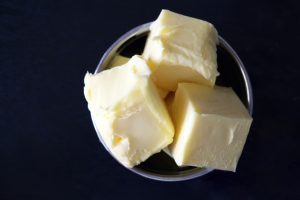When you first hear of grass-fed butter an image of a stick of butter with sprigs of grass sticking out immediately cames to mind. Though this is far from what grass-fed butter is, the basics are the same. Grass-fed butter is butter made from the milk of cows that are only fed grass. Some fear butter in general as heart disease is on the rise. But butter was around long before the concerns of heart disease. This means that healthier forms of butter may be a healthier alternative to those who want to be both heart-wise and enjoy the taste of butter-rich treats.
Grass-Fed Butter Is A Healthy Choice
Butter, in general, was thought to be horrible because of high levels of saturated fat, but some studies have found that saturated fats are not the demonic food parts they have been made out to be in the past. In addition, grass-fed butter contains a large amount of vitamin K. Vitamin K is important for optimal heart health but is rarely discussed. While it is true that vitamin K is also found in leafy greens, vitamin K2 is found in animal foods. Vitamin K2 is important to help keep calcium from your arteries and limit the chances of build-up that leads to heart disease.

Grass-Fed Butter Is A Healthy Choice
Is grass-fed butter really better for you?
High-fat dairy products, including those from grass-fed cows, are a top source for vitamin K. This can drastically reduce the risk of heart disease and osteoporosis. Grass-fed butter also includes fatty acid CLA. While fatty acids sound like bad news, CLA can actually positively affect physiology and biochemistry to some degree. CLA is conjugated linoleic acid that is often used as a fat loss supplement. Grass-fed butter contains five times the amount of CLA than butter that comes from cows that are grain-fed. Additionally, grass-fed butter is much higher in Omega-3 fatty acids in comparison to grain-fed counterparts.
So while you may not want to slather massive amounts of butter on every food possible, using grass-fed butter offers a healthy alternative than the grain-fed counterpart. So you no longer need to avoid all butter as an evil heart and artery hardening ingredient, but use the healthier alternative that is often available in a local store.




